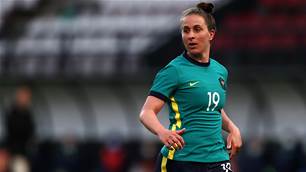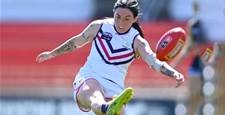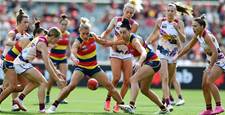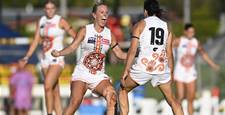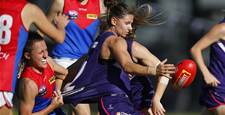For the first time in 12 years a Matildas squad has been selected for an Olympic Games.
For the first time in 12 years a Matildas squad has been selected for an Olympic Games.
The 18 player roster is the strongest Australia has produced in this generation. Whether it is the strongest ever is fodder for a cross-generational debate.
With an average of 46.8 appearances, it is the most experienced squad the Matildas have sent to an international tournament since the 2007 FIFA Women's World Cup and the most experienced squad since 2009 – a year that saw the international retirements of Cheryl Salisbury and Joanne Peters. This is despite an average age of 23.5.
[MORE: Matildas 18 player Rio 2016 Olympic Roster named | Olympic Coverage]
The provisional list of 35 players included a host of good players and whittling it down to 25, and then to 18 meant selecting the squad could not have been an easy task.
"In the past maybe, the squad has probably lacked the depth where we could leave out good players," said Alen Stajcic.
"The best part of the process this time is that we have had to leave out good players in good form. I know there are four or five players who haven't been selected who could easily come into this team. That gives me great confidence for this team and for the future."
Omissions
So who were some were some of those players Stajcic mentioned?
Teigen Allen and Georgia Yeoman-Dale went close. Allen and Yeoman-Dale came into contention on the back of solid W-League seasons and attended several camps pre and post-Olympic qualifiers. Both players are pacy and can provide attacking support. Allen, in particular, had the experience necessary as an Asian Cup and World Cup player. Although in form, in the end they were unable to dislodge the incumbents.
The same could be said for Ellie Brush who is regularly lining up for the Houston Dash in the NWSL. Brush was also monitored, as was fellow NWSL forward Hayley Raso and Japan based striker Ashleigh Sykes. The Australian based players also evaluated included Canberra's Caitlin Munoz, who also gained call ups due to W-League form, and Newcastle's Tara Andrews.
"There were 7 or 8 phone calls to players overseas who haven't been selected," said Stajcic.
"They know why they were or weren't selected and they know where they are in the pecking order should we require some of those players to fill in spots as we move forward."
In the wash up the roster saw the 18 players come from the squads of the 2015 World Cup and 2016 Olympic Qualifiers. The first time in years the Matildas have had a low turnover. So what are the strengths and concerns relating to the squad?
Goalkeepers
It is difficult to overstate the importance of Lydia Williams. In the past five years Williams has grown in stature to become of the top five goalkeepers in the world – if not top 3. Williams is to Australia as Hope Solo is to the United States.
While Mackenzie Arnold is a solid back up goalkeeper, is yet to have the same breadth of experience. Williams and Arnold are similar goalkeepers – both good shot stoppers and reasonably comfortable with their feet – however, Arnold is where Williams was 5-6 years ago and only time (and matches) can bridge that gap.
Cover question
Casey Dumont is the alternate goalkeeper and a solid choice. A fully fit Dumont is one of the top 3 goalkeepers in the W-League. While her international experience is low, she has proven herself in high pressure situations (grand finals and penalty shootouts) domestically.
Defenders
Stajcic has retained the defensive combinations that have done the job for Australia in the last two international tournaments. Alanna Kennedy is the in-form centre-back for club WNY Flash and country and will most probably partner Laura Alleway. Alleway was sound during the W-League season and Olympic Qualifiers but her play has been more inconsistent during the NWSL season. Regardless, the Kennedy/Alleway partnership has been the cornerstone of the Matildas defence.
The full back roles are relatively settled with Steph Catley on the left, another top 3 player in her position, and Clare Polkinghorne occupying the right. A two way player, Catley forms one of the best left sided combinations with Lisa De Vanna.
Meanwhile the experienced Polkinghorne has all but locked down right flank. Polkinghorne is a calm and steady head in that position but can be caught out for foot speed. Youngster Ellie Carpenter has that requisite pace but is absent 84 caps of experience including three World Cups. The other option is Caitlin Foord. Foord brings the pace and experience in that position having locked down that position in both the 2011 and 2015 World Cups. However, her form up front has been blistering and moving her could be robbing Peta to pay Paula.
Cover question
Australia has Polkinghorne as a natural replacement at centre back. Alternatively, Caitlin Cooper, a specialist championship winning central defender, is available on the alternates list. The full backs are less certain with no natural replacement for Catley, although Foord played out on the left in Australia's opening World Cup game against the United States and Carpenter's versatility – which was a large reason for her selection – means she could switch flanks if required. Again, both options come with the questions already stated above.
Midfielders
Australia's midfield nucleus is pretty set in the trio of Elise Kellond-Knight, Katrina Gorry and Emily van Egmond. All three are known quantities and possess complementary skill sets.
Cover question
Tameka Butt has been the first choice midfield substitute in recent times. Meanwhile Chloe Logarzo can also play an attacking midfielder role if required. It was her performances in that position that saw her earn a call up after a long absence from the national team. The holding midfielder role is key area with Australia struggling in recent times without Kellond-Knight as the stable rudder. Against New Zealand Van Egmond dropped back into the role with good effect but the most natural replacement, if required, is alternate Aivi Luik. Luik is greatly experienced was a key member for Melbourne City in their premiership / championship double.
Forwards
The forwards have the greatest strength and depth of the squad. There is a good mix of pace, power, ability to hold the ball or counter attack and, most importantly, proven goal scorers. Stajcic has a choice of three central players; Michelle Heyman, Kyah Simon or Larissa Crummer. As with the past two tournaments, Heyman and Simon should split the number 9 duties while Crummer has provided a spark off the bench.
Out wide is where it gets exciting with Sam Kerr, De Vanna, Logarzo and Foord. All four have proved in the past 12 months that they can provide good width up front and are flexible enough to switch flanks if things aren't going to plan. Crucially in this Australian set up, they are all able to work back, to support the midfield and defence, as well as they push forward.
Cover question
With the flexibility of the six forwards, Australia has the most combinations available in this area. Stajcic can safely go with a number of different trios and still be confident with the result. This is of course dependent on Kerr returning to match fitness in the next weeks. However, even if used exclusively off the bench Kerr has demonstrated with Sky Blue FC that she can be a game changing substitute. Cover wise, alternate Emily Gielnik – who brings similar attributes to the selected trio - is another option centrally if required.
2016 Matildas Olympic Roster (by position)
Goalkeepers: Lydia Williams (Houston Dash/Canberra United), Mackenzie Arnold (Perth Glory)
Defenders: Clare Polkinghorne (Brisbane Roar), Laura Alleway (Orlando Pride / Melbourne City), Alanna Kennedy (WNY Flash / Sydney FC), Stephanie Catley (Orlando Pride / Melbourne City), Ellie Carpenter (Western Sydney Wanderers)
Midfielders: Elise Kellond-Knight (Potsdam Turbine), Emily van Egmond (FFC Frankfurt), Katrina Gorry (Brisbane Roar), Tameka Butt (Brisbane Roar), Caitlin Foord (Perth Glory), Chloe Logarzo (Eskilstuna United / Newcastle Jets)
Forwards: Lisa De Vanna (Melbourne City), Michelle Heyman (Canberra United), Kyah Simon (Boston Breakers / Sydney FC), Samantha Kerr (Sky Blue FC / Perth Glory), Larissa Crummer (Melbourne City)
Alternates: Caitlin Cooper, Casey Dumont, Aivi Luik, Emily Gielnik
Matildas Schedule
Canada v Australia
Corinthians Arena, Sao Paulo
Wednesday, 4 August 2016
Kick off: 4:00am (AET)
Germany v Australia
Corinthians Arena, Sao Paulo
Saturday, 7 August 2016
Kick off: 7:00am (AET)
Australia v Zimbabwe
Fonte Nova Arena, Salvador
Tuesday, 10 August 2016
Kick off: 5:00am (AET)
Related Articles
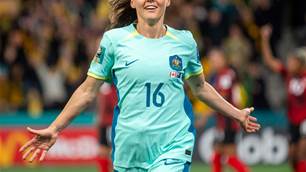
Aussies Abroad: Dub champions gutted, ribbons Raso on the move, and transfers, transfers, transfers

New FA Chief Football Officer to 'disrupt' Australian game
